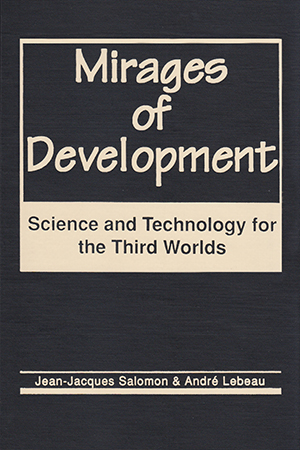
- 1993/224 pages
Mirages of Development:
Science and Technology for the Third Worlds
Salomon and Lebeau consider why the great majority of Third World countries have failed to solve the problems of underdevelopment by relying on science and technology, while a very few of them—the newly industrialized countries—have at least partially succeeded.
Opposed to the smug optimism of scientific enthusiasts (though equally opposed to dismal prophecies), the authors argue that, while technological advances may speed the process of modernization in isolated instances, they cannot induce the social transformations that are a prerequisite of development. Scientific research and technological innovation can be effective, they conclude, only where social structures, institutions, and habits have first eliminated the "blocking factors" that are characteristic of traditional societies. It is also essential to recognize that less advanced technologies still have much to contribute to improving productivity and living standards and should not be neglected in the search for solutions.







